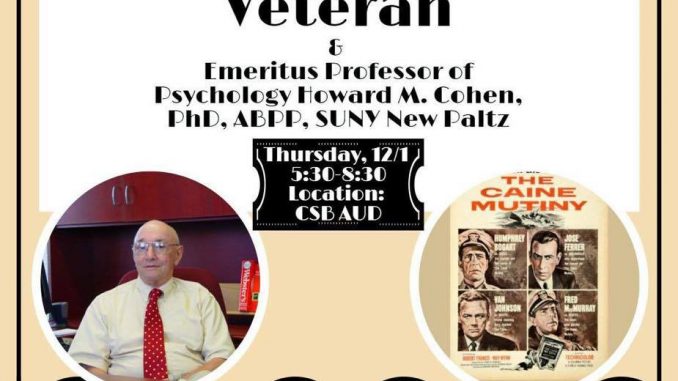
Throughout SUNY New Paltz’s history, there have been hundreds of accomplished and distinguished faculty members that have impacted this campus. Among them is Dr. Howard M. Cohen.
Though Cohen is most widely known as the first chair of the psychology department, he also holds another interesting distinction: he was the first American to swim in Tokyo Bay.
But to say that Cohen’s life is defined by a series of firsts is an understatement. He has served as president of the New York State Psychological Association, which awarded him a lifetime achievement award in 2003, and served as president of the American Academy of Clinical Psychology. At 90 years old, Cohen remains a lively presence as an Emeritus Professor of psychology.
Decades earlier, in August of 1945, mere days after the Japanese surrender that ended World War II, Cohen was a 19-year-old pilot serving on the U.S.S. Endicott as it approached the waters surrounding the capital. According to Cohen, the bay had previously been littered with mines that the U.S. had set up to essentially starve the city.
While waiting in the bay for much larger military ships to arrive for the surrender ceremony, Cohen spotted what he believed to be an aspirin bottle bobbing in the water.
“At first, I tried reaching for it with a large pole that I had. Don’t ask me why I had a large pole at the time,” he said. “After it started to drift away, I jumped into the water to grab it.”
It was only once he climbed back aboard the Endicott that he realized he had accidentally leapt into history books. In addition to his service on the Endicott, Cohen also served as a 3rd class quartermaster on the U.S.S. Caine, the same ship featured in the renowned psychological thriller, “The Caine Mutiny.”
On Thursday, Dec. 1, Cohen spoke at a screening of the 1954 Academy Award-nominated film that was held in the Coykendall Science Building Auditorium. The event was co-sponsored by the Office of Veteran and Military Services, the Psychology Department and the Undergraduate Psychology Association.
The film stars Humphrey Bogart as Capt. Phillip Francis Queeg, the replacement captain of the sloppily-run Caine. Initially he institutes tighter rules for the crew, but eventually members of the ship and senior military officials grow suspicious of his eccentric and paranoid nature. Ultimately, he is relieved of his position by executive officer Stephen Maryk during a typhoon, which leads to a controversial court-martial for mutiny.
While Cohen never had to go through the psychological or legal drama highlighted in the movie, he did survive two typhoons during the war. Cohen said that the ships he served on were destroyer minesweepers, which quickly earned the nickname of “tin cans,” due to their thin levels of protection and weak hulls.
In response to a question about the accuracy of the film’s portrayal of Capt. Queeg with relation to the military atmosphere during World War II, Cohen acknowledged that there were indeed “some crazy captains” who were “not a friend to anybody.”
Addressing the psychology of the film, Cohen spoke of his friendly professional correspondence with then-Republican presidential nominee Sen. Barry Goldwater during the 1964 presidential campaign.
Cohen said that he reached out to Goldwater after he had been troubled by a survey of 1,189 psychologists for the fall issue of Fact magazine. The editors of the publication asked psychologists across the country, some of international renown, one question: “Do you believe Barry Goldwater is psychologically fit to serve as president of the United States?”
The responses, according to Cohen, speculated about whether the “feeble-minded” Goldwater suffered from schizophrenia, mental instability, obsessive compulsive disorder or suicidal tendencies. These unprecedented reactions to a political leader, by doctors who had never even met him, disturbed Cohen, who reached out to Goldwater to express his frustrations.
“In recent years, psychologists have tried to get away from using negative terms like that, especially those that have been adopted by the public, regardless of their original meaning,” Cohen said.
